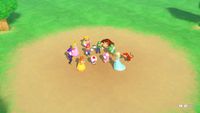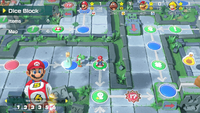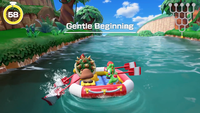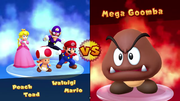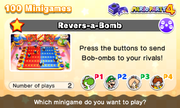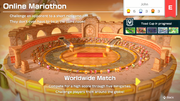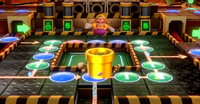Super Mario Party: Difference between revisions
(→Minigames: Was it better before this?) Tag: Mobile edit |
|||
| Line 26: | Line 26: | ||
==Gameplay== | ==Gameplay== | ||
[[File:SMP image1.png|thumb|left|Mario's turn, prior to rolling the Dice Block, in the Mario Party mode.]] | [[File:SMP image1.png|thumb|left|Mario's turn, prior to rolling the Dice Block, in the Mario Party mode.]] | ||
''Super Mario Party'' reverts to the traditional way of playing ''Mario Party'', where four players take turns to navigate around a linear board dictated by how much they have rolled through the Dice Block. When a character lands on a space, they receive effects dependent on what the space is, such as a [[Blue Space]] giving the player 3 coins or a [[Red Space]] subtracting 3 coins from the player. They can also spend [[coin]]s to buy items from [[Flutter]] which can help them or hurt other players; these item shops can be triggered by passing by them in Mario Party or landing on | ''Super Mario Party'' reverts to the traditional way of playing ''Mario Party'', where four players take turns to navigate around a linear board dictated by how much they have rolled through the Dice Block. When a character lands on a space, they receive effects dependent on what the space is, such as a [[Blue Space]] giving the player 3 coins or a [[Red Space]] subtracting 3 coins from the player. They can also spend [[coin]]s to buy items from [[Flutter]] which can help them or hurt other players; these item shops can be triggered by passing by them in Mario Party or landing on their corresponding spaces in Partner Party. The game borrows the ally mechanics from ''Mario Party: Star Rush'' allowing players to increase their team of characters by landing on Ally Spaces or using a [[Buddy Phone]]; allies gained from the former are decided by a roulette and are randomly decided in the latter case. Allies contribute to Dice Rolls by either adding 1 or 2 to the total, and they participate in specially designated Team Minigames. | ||
Prior to starting the game, players roll a dice block to determine turn order. In Mario Party, higher turn orders determine who goes first, while in Partner Party, the team with the higher overall dice count goes first. The overall goal of the game is to purchase the most [[Star (Mario Party series)|Star]]s from [[Toadette]], who serves as the host of the Star Space in this game. Stars cost 10 coins to buy, and after a player has purchased the Star, Toadette warps to another location of the board. In Mario Party, players can pass by Toadette to purchase Stars, while in Partner Party, players are required to land on the Star Space in order to receive Stars from Toadette. | Prior to starting the game, players roll a dice block to determine turn order. In Mario Party, higher turn orders determine who goes first, while in Partner Party, the team with the higher overall dice count goes first. The overall goal of the game is to purchase the most [[Star (Mario Party series)|Star]]s from [[Toadette]], who serves as the host of the Star Space in this game. Stars cost 10 coins to buy, and after a player has purchased the Star, Toadette warps to another location of the board. In Mario Party, players can pass by Toadette to purchase Stars, while in Partner Party, players are required to land on the Star Space in order to receive Stars from Toadette. | ||
| Line 34: | Line 34: | ||
Minigames are played, selected by a roulette, at the end of every turn, and the type of minigame is determined by the spaces players landed on. If all players land on the same-colored space as each other, a Free-for-all minigame is played. If one player lands on a different, non-green space than the rest of the players, a 1-vs-3 minigame is played, where players who land on the same-colored space are placed in the same team as each other. If players land on an equal amount of non-green spaces, a 2-vs-2 minigame is played, teamed up depending on the color; Team Minigames may be thrown into the mix, where the player's current allies may participate if they are received. If players land on a Green Space, the color is randomly determined to be either blue or red. Prior to playing the minigame, players view the rules and can practice; each minigame comes with its own rules and controls. Players can act out in the minigame's instruction menu prior to starting the minigame, replacing the practice feature altogether. Whichever player wins the minigame earns the most coins, while players who do not perform as well earn less coins. In Partner Party, Free-for-all, 2-vs-2, and Team Minigames are played; due to the mode having no colored spaces, all of those minigames show up in the Minigame Roulette. | Minigames are played, selected by a roulette, at the end of every turn, and the type of minigame is determined by the spaces players landed on. If all players land on the same-colored space as each other, a Free-for-all minigame is played. If one player lands on a different, non-green space than the rest of the players, a 1-vs-3 minigame is played, where players who land on the same-colored space are placed in the same team as each other. If players land on an equal amount of non-green spaces, a 2-vs-2 minigame is played, teamed up depending on the color; Team Minigames may be thrown into the mix, where the player's current allies may participate if they are received. If players land on a Green Space, the color is randomly determined to be either blue or red. Prior to playing the minigame, players view the rules and can practice; each minigame comes with its own rules and controls. Players can act out in the minigame's instruction menu prior to starting the minigame, replacing the practice feature altogether. Whichever player wins the minigame earns the most coins, while players who do not perform as well earn less coins. In Partner Party, Free-for-all, 2-vs-2, and Team Minigames are played; due to the mode having no colored spaces, all of those minigames show up in the Minigame Roulette. | ||
In the last three turns, replacing the [[Last Five Turns Event]], Toad and Toadette host character predictions, where a random character receives a bonus item. At the end of the match, two Bonus Stars are issued (three if the game was set to 20 turns), and they are selected from a pool of Bonus Stars. These Stars are the following: | In the last three turns, replacing the [[Last Five Turns Event]], Toad and Toadette host character predictions, where a random character receives a bonus item (frequently the player in last place). At the end of the match, two Bonus Stars are issued (three if the game was set to 20 turns), and they are selected from a pool of Bonus Stars. These Stars are the following: | ||
*'''Minigame Star''': Given to players who have won the most minigames. | *'''Minigame Star''': Given to players who have won the most coins in minigames. | ||
*'''Rich Star''': Given to players who have the most coins throughout the game. | *'''Rich Star''': Given to players who have collected the most coins throughout the game. | ||
*'''Eventful Star''': Given to players who have landed on the most [[Event Space]]s. | *'''Eventful Star''': Given to players who have landed on the most [[Event Space]]s. | ||
*'''Item Star''': Given to players who have used the most items. | *'''Item Star''': Given to players who have used the most items. | ||
*'''Ally Star''': Given to players who have the most allies. | *'''Ally Star''': Given to players who have the most allies at the end of the game. | ||
*'''Buddy Star''': Given to a player who has a particular, random ally. | *'''Buddy Star''': Given to a player who has a particular, random ally. | ||
*'''Sightseer Star''': Given to players who have traveled the most spaces. | *'''Sightseer Star''': Given to players who have traveled the most spaces. | ||
*'''Slowpoke Star''': Given to players who have traveled the least spaces. | *'''Slowpoke Star''': Given to players who have traveled the least spaces. | ||
*'''Unlucky Star''': Given to players who have landed on the most [[Red Space]]s and [[Bad Luck Space]]s. (Mario Party only) | *'''Unlucky Star''': Given to players who have landed on the most [[Red Space]]s and [[Bad Luck Space]]s (including Extra Bad Luck Spaces). (Mario Party only) | ||
*'''Stompy Star''': Given to players who have stomped on other players the most. (Partner Party only) | *'''Stompy Star''': Given to players who have stomped on other players the most. (Partner Party only) | ||
*'''Doormat Star''': Given to players who have been stomped on the most. (Partner Party only) | *'''Doormat Star''': Given to players who have been stomped on the most. (Partner Party only) | ||
| Line 65: | Line 65: | ||
====Partner Party==== | ====Partner Party==== | ||
{{quote2|A team edition of Mario Party featuring free movement and shared dice rolls.|Partner Party}} | {{quote2|A team edition of Mario Party featuring free movement and shared dice rolls.|Partner Party}} | ||
Partner Party has two teams of two players all independently navigate around the same boards as in the Mario Party mode, except the boards have become nonlinear in a grid-like fashion, similar to Toad Scramble from ''[[Mario Party: Star Rush]]''. The amount of turn options are the same as Mario Party, though players can select their team configuration prior to starting the match. In this mode, teammates share their items, coins and stars, and, in a feature introduced in ''Super Mario Party'', share their dice roll amount as well. Players can additionally collect allies on the board, though the ally's benefits occur only to the teammate who collected that ally. | Partner Party has two teams of two players all independently navigate around the same boards as in the Mario Party mode, except the boards have become nonlinear in a grid-like fashion, similar to Toad Scramble from ''[[Mario Party: Star Rush]]''. The amount of turn options are the same as Mario Party, though players can select their team configuration prior to starting the match. In this mode, both teammates share their items, coins and stars, and, in a feature introduced in ''Super Mario Party'', share their dice roll amount as well. Players can additionally collect allies on the board, though the ally's benefits occur only to the teammate who collected that ally. | ||
Partner Party has featureless spaces, in which nothing happens when a player lands on a blank space in favor of the removal of Blue and Red Spaces. Instead of passing by features such as Flutter shops and Star Spaces, players are required to land on those spaces to earn their benefits. Depending on the layout of the board, players have to roll precisely, such as rolling an even or an odd to land on the space or an exact amount for narrow dead-ends and corridors. Players can hi-five each other at the end of | Partner Party has featureless spaces, in which nothing happens when a player lands on a blank space in favor of the removal of Blue and Red Spaces. Instead of passing by features such as Flutter shops and Star Spaces, players are required to land on those spaces to earn their benefits. Depending on the layout of the board, players have to roll precisely, such as rolling an even or an odd to land on the space or an exact amount for narrow dead-ends and corridors. Players can hi-five each other at the end of 2-vs-2 and Team Minigames or if they land on the same space to earn bonus coins, and the hi-five feature occurs whenever a positive event happens, such as starting the game or earning a Star. If two players land on the Star Space on the same turn, they both have a chance of obtaining a Star if they can afford it. Players can stomp their opponents to steal coins from them, and if a player lands on the same space as an opponent, they can take 3-5 coins from them (If both teammates on the rival team are standing on the same space, then the player can stomp both teammates). Occurring during the middle of the match, Kamek adds hidden [[Bad Luck Space]]s on the board that harm any player who unluckily lands on its space. On the last 3 turns, Kamek turns them into Extra Bad Luck Spaces hidden in the board. | ||
1-vs-3 minigames do not occur in this mode, and due to the removal of Blue and Red spaces, available types of minigames are all featured in the Minigame Roulette, with Team Minigames being indicated by a special icon next to their name. In Free-for-all Minigames, the teammate who performs the best earns eight coins for their team, while the losing team earns two coins. In 2-vs-2 and Team Minigames, the team who wins the minigame earns eight coins (ten coins if they high-five), while the losing team earns two. | 1-vs-3 minigames do not occur in this mode, and due to the removal of Blue and Red spaces, available types of minigames are all featured in the Minigame Roulette, with Team Minigames being indicated by a special icon next to their name. In Free-for-all Minigames, the teammate who performs the best earns eight coins for their team, while the losing team earns two coins. In 2-vs-2 and Team Minigames, the team who wins the minigame earns eight coins (ten coins if they high-five), while the losing team earns two. | ||
Revision as of 16:36, June 4, 2021
Template:Infobox Super Mario Party is a game in the Mario Party series, released for the Nintendo Switch on October 5, 2018. It is the twenty-fourth installment in the series overall, the eleventh home console installment in the series, and the first home console Mario Party game to not be a numbered installment since the original Mario Party game.
Described by Nintendo as a "complete relaunch"[1] and "complete refresh"[2] of the Mario Party series when revealed at E3 2018, the game "goes back to the four-player basics as [players] take turns and race across the board searching for Stars"[2] as seen in the Mario Party installments prior to Mario Party 9, but also incorporates elements from the more contemporary Mario Party games, including the "ally" mechanics from Mario Party: Star Rush.[2] Additionally, the game takes advantage of Nintendo Switch hardware for its minigames, such as flicking the Joy-Con as if it were a frying pan handle. Players can also link multiple Nintendo Switch consoles together for a single, larger alteration of the display for the game. The game is the first installment in the Mario Party franchise to incorporate online play, as boards and minigames can be played online.
Story
Mario, Luigi, Peach, Daisy, Wario, Waluigi, Yoshi, Rosalina, Donkey Kong, Diddy Kong, Toad, and Toadette are standing around, with each of the playable characters claiming that they should be the "Super Star". Mario suggests that they have a party to determine who the "Super Star" will be, which the group agrees to, with Toad and Toadette being judges. Suddenly, Bowser appears with Bowser Jr., Goomba, Boo, Koopa Troopa, Hammer Bro, Shy Guy, Monty Mole, Pom Pom, and Dry Bones, and says that he or one of his minions could also be the "Super Star". To ensure that the judging is "fair" and "impartial", he summons Kamek to judge alongside Toad and Toadette. Kamek then creates a venue for the party.
There are five collectible Gems in the game. When all 4 boards in Mario Party mode are completed, the Gem of Tenacity is awarded. Similarly, the Gem of Spirit is awarded when the Hard difficulty in Sound Stage is completed; the Gem of Courage is awarded upon sailing every branch in River Survival; when all the stages in Partner Party are cleared, the Gem of Love is awarded; and when every Challenge Road stage is cleared, the Gem of Passion is awarded. When all five gems are collected, they fuse together to create the victory podium, which the newly crowned "Super Star" stands on. The partygoers, even including Bowser and Bowser Jr., agree to get along, at least until the "next party".
Gameplay
Super Mario Party reverts to the traditional way of playing Mario Party, where four players take turns to navigate around a linear board dictated by how much they have rolled through the Dice Block. When a character lands on a space, they receive effects dependent on what the space is, such as a Blue Space giving the player 3 coins or a Red Space subtracting 3 coins from the player. They can also spend coins to buy items from Flutter which can help them or hurt other players; these item shops can be triggered by passing by them in Mario Party or landing on their corresponding spaces in Partner Party. The game borrows the ally mechanics from Mario Party: Star Rush allowing players to increase their team of characters by landing on Ally Spaces or using a Buddy Phone; allies gained from the former are decided by a roulette and are randomly decided in the latter case. Allies contribute to Dice Rolls by either adding 1 or 2 to the total, and they participate in specially designated Team Minigames.
Prior to starting the game, players roll a dice block to determine turn order. In Mario Party, higher turn orders determine who goes first, while in Partner Party, the team with the higher overall dice count goes first. The overall goal of the game is to purchase the most Stars from Toadette, who serves as the host of the Star Space in this game. Stars cost 10 coins to buy, and after a player has purchased the Star, Toadette warps to another location of the board. In Mario Party, players can pass by Toadette to purchase Stars, while in Partner Party, players are required to land on the Star Space in order to receive Stars from Toadette.
Super Mario Party introduces the choice of using character specific die prior to rolling, where players can either opt for the standard 1-6 Dice Block or the character's unique Dice Block, which carries pros and cons associated with it. If players receive allies, they have option to use their designated Dice Block instead.
Minigames are played, selected by a roulette, at the end of every turn, and the type of minigame is determined by the spaces players landed on. If all players land on the same-colored space as each other, a Free-for-all minigame is played. If one player lands on a different, non-green space than the rest of the players, a 1-vs-3 minigame is played, where players who land on the same-colored space are placed in the same team as each other. If players land on an equal amount of non-green spaces, a 2-vs-2 minigame is played, teamed up depending on the color; Team Minigames may be thrown into the mix, where the player's current allies may participate if they are received. If players land on a Green Space, the color is randomly determined to be either blue or red. Prior to playing the minigame, players view the rules and can practice; each minigame comes with its own rules and controls. Players can act out in the minigame's instruction menu prior to starting the minigame, replacing the practice feature altogether. Whichever player wins the minigame earns the most coins, while players who do not perform as well earn less coins. In Partner Party, Free-for-all, 2-vs-2, and Team Minigames are played; due to the mode having no colored spaces, all of those minigames show up in the Minigame Roulette.
In the last three turns, replacing the Last Five Turns Event, Toad and Toadette host character predictions, where a random character receives a bonus item (frequently the player in last place). At the end of the match, two Bonus Stars are issued (three if the game was set to 20 turns), and they are selected from a pool of Bonus Stars. These Stars are the following:
- Minigame Star: Given to players who have won the most coins in minigames.
- Rich Star: Given to players who have collected the most coins throughout the game.
- Eventful Star: Given to players who have landed on the most Event Spaces.
- Item Star: Given to players who have used the most items.
- Ally Star: Given to players who have the most allies at the end of the game.
- Buddy Star: Given to a player who has a particular, random ally.
- Sightseer Star: Given to players who have traveled the most spaces.
- Slowpoke Star: Given to players who have traveled the least spaces.
- Unlucky Star: Given to players who have landed on the most Red Spaces and Bad Luck Spaces (including Extra Bad Luck Spaces). (Mario Party only)
- Stompy Star: Given to players who have stomped on other players the most. (Partner Party only)
- Doormat Star: Given to players who have been stomped on the most. (Partner Party only)
After this, the winner is announced, and players can then view the statistics of the player's progress through the game, such as a line graph detailing the Star collecting progress or how many times a particular space has been landed on.
The game can only be played with a single Joy-Con per player, and is not compatible with the Pro Controller or Handheld Mode, unlike previous Mario games on the Switch, due to some of the minigames using motion control. The game is also compatible with local wireless play.
Game modes
Players are first introduced to the Party Plaza, a hub where players can roam to various interest points, hosted by Toads of various colors. Players can explore the hub with a party of four characters, which serve as the characters participating for all modes. If players do not have enough human players, they are filled with a recommendation of a random selection of CPU players and their difficulty. Players can change their characters and CPU characters plus their difficulty by talking to Blue Toad at the gate of the Party Plaza.
The initially available modes are accessed by walking up to the interest points and talking to the Toads who host them. Two modes are locked and are accessed through a Warp Pipe in the left and right areas of the Party Plaza. They are obstructed with a Piranha Plant and stun players who attempt to jump into it. After their unlock requirements are met, Kamek removes the Piranha Plant for the players.
Players in the hub can access the Party Pad with , where they can quickly access different parts of the hub through a menu instead. The Party Pad also serves as a manual, where players can read descriptions for the various features in the game. Lastly, players can purchase stickers with earned Party Points and view their collected gems. amiibo functionality is accessed through the Party Pad, where scanned amiibo earns players shiny stickers for specific compatible amiibo and bonus Party Points for all other amiibo.
Mario Party
Template:Quote2 A traditional four-player battle royale where each player competes for the most Stars, which are purchased from Toadette if players pay 10 coins. This mode uses the default ruleset described above, as players navigate through a linear board with many junctions and board specific features with Dice Blocks. Four boards are available, with one being unlockable. Unlike previous Mario Party titles, the only settings players can adjust for the boards are the amount of turns, from 10, 15, and 20 turns max (30 turns max on Kamek's Tantalizing Tower). Boards already beaten have their corresponding icons highlighted yellow, and players unlock Kamek's Tantalizing Tower if the available boards are all played on, and players earn the Gem of Tenacity if all boards in this mode are completed.
Partner Party
Template:Quote2 Partner Party has two teams of two players all independently navigate around the same boards as in the Mario Party mode, except the boards have become nonlinear in a grid-like fashion, similar to Toad Scramble from Mario Party: Star Rush. The amount of turn options are the same as Mario Party, though players can select their team configuration prior to starting the match. In this mode, both teammates share their items, coins and stars, and, in a feature introduced in Super Mario Party, share their dice roll amount as well. Players can additionally collect allies on the board, though the ally's benefits occur only to the teammate who collected that ally.
Partner Party has featureless spaces, in which nothing happens when a player lands on a blank space in favor of the removal of Blue and Red Spaces. Instead of passing by features such as Flutter shops and Star Spaces, players are required to land on those spaces to earn their benefits. Depending on the layout of the board, players have to roll precisely, such as rolling an even or an odd to land on the space or an exact amount for narrow dead-ends and corridors. Players can hi-five each other at the end of 2-vs-2 and Team Minigames or if they land on the same space to earn bonus coins, and the hi-five feature occurs whenever a positive event happens, such as starting the game or earning a Star. If two players land on the Star Space on the same turn, they both have a chance of obtaining a Star if they can afford it. Players can stomp their opponents to steal coins from them, and if a player lands on the same space as an opponent, they can take 3-5 coins from them (If both teammates on the rival team are standing on the same space, then the player can stomp both teammates). Occurring during the middle of the match, Kamek adds hidden Bad Luck Spaces on the board that harm any player who unluckily lands on its space. On the last 3 turns, Kamek turns them into Extra Bad Luck Spaces hidden in the board.
1-vs-3 minigames do not occur in this mode, and due to the removal of Blue and Red spaces, available types of minigames are all featured in the Minigame Roulette, with Team Minigames being indicated by a special icon next to their name. In Free-for-all Minigames, the teammate who performs the best earns eight coins for their team, while the losing team earns two coins. In 2-vs-2 and Team Minigames, the team who wins the minigame earns eight coins (ten coins if they high-five), while the losing team earns two.
If players complete all boards in Partner Party, they earn the Gem of Love.
River Survival
A co-op-based mode where four players paddle an inflatable boat on a river filled with features and hazards to the finish before time runs out. Prior to setting up the game, players can select their configuration of their rowers in a clockwise manner. Players are then guided through a tutorial with Toad explaining the controls. After the game begins, players need to keep on track with the river while avoiding rocks and the sides of the river. Players can find balloons, which can be popped to play special Co-op minigames, where the four players need to work together to win the minigame. Depending on how well the players perform, they earn a rank based on their score, which then translates to extra time being rewarded. When players reach a junction, they can choose the path to go on; the preview of what the path is going to be like is indicated by their image on top. Depending on what path they choose, they can encounter more hazards, dash panels, ramps, and + Clocks to increase their time. Special characters can appear depending on the path chosen, such as a Koopa Paratroopa taking a snapshot of characters as they descend down the waterfall, to three boss enemies and their smaller variants being encountered, such as Mega Blooper, Mega Cheep Cheep, and Kamek himself (labeled as Mysterious Kraken, Mysterious Leviathan, and Mysterious Sorcerer respectively).
If players complete River Survival on three paths, they unlock Donkey Kong as a playable character (on the time they unlock him, players can see him waving at the finish line). If players complete all branches of River Survival, they earn the Gem of Courage, in addition to a hard variation of River Survival being unlocked.
Routes
Routes below are presented in reverse order, and arranged from left to right. At each fork, players may only choose between the two subsequent routes directly adjacent to the current route.
| Fifth possible route | Jumping Jeopardy | Monster Attack! | Kamek's Curse | Cheep Cheep Swarms | Beyond the Jungle | |||||||||||||||||||||||||||||||||||||||||||||||||||||||||||||||||||||||||||||||||||||||||||||||||||||||||||||||||||
|---|---|---|---|---|---|---|---|---|---|---|---|---|---|---|---|---|---|---|---|---|---|---|---|---|---|---|---|---|---|---|---|---|---|---|---|---|---|---|---|---|---|---|---|---|---|---|---|---|---|---|---|---|---|---|---|---|---|---|---|---|---|---|---|---|---|---|---|---|---|---|---|---|---|---|---|---|---|---|---|---|---|---|---|---|---|---|---|---|---|---|---|---|---|---|---|---|---|---|---|---|---|---|---|---|---|---|---|---|---|---|---|---|---|---|---|---|---|---|---|---|
| Fourth possible route | Breakneck Pace | Rocky Sailing | Blooper Pools | Eye of the Needle | ||||||||||||||||||||||||||||||||||||||||||||||||||||||||||||||||||||||||||||||||||||||||||||||||||||||||||||||||||||
| Third possible route | Rugged Ramps | High-Flying Balloons | Rapids Run | |||||||||||||||||||||||||||||||||||||||||||||||||||||||||||||||||||||||||||||||||||||||||||||||||||||||||||||||||||||
| Second possible route | Waterfall Plunge | Cheep Cheep Schools | ||||||||||||||||||||||||||||||||||||||||||||||||||||||||||||||||||||||||||||||||||||||||||||||||||||||||||||||||||||||
| First route | Gentle Beginning | |||||||||||||||||||||||||||||||||||||||||||||||||||||||||||||||||||||||||||||||||||||||||||||||||||||||||||||||||||||||
Sound Stage
Template:Quote2 A mode in which players play rhythm-based minigames back-to-back while trying to get the highest score. Characters use motion controls to stimulate the rhythms imposed by the minigames in this mode. Prior to playing minigames, players pump their fists to the rhythm as a tutorial before starting out on the minigames. The mode comes in three difficulties: Normal difficulty has players participating in three minigames, Remix difficulty has players participating in 6 minigames, where the last three minigames are sped up versions of the first three minigames, while Hard difficulty has a set of three more difficult rhythm minigames. When all three difficulties are beaten, the player is awarded with the Gem of Spirit.
Challenge Road
Template:Quote2 Playing very similarly to the various challenge gauntlets from previous entries such as Endurance Alley from Mario Party 6, this time on a world map similar to the Minigame Island in Mario Party: The Top 100. Challenge Road is a one-player mode where the player plays a consecutive set of 80 minigames while trying to complete various challenges, such as earning a particular amount of points or finishing a minigame within a time limit. The mode becomes available when all minigames are unlocked. Players navigates through the minigames split up into six worlds: Shell Street, Chestnut Forest, Mushroom Beach, Ghostly Hollow, Salty Sea, and End of the Road. After players beat the final minigame involving Bowser's team on End of the Road, they are awarded with the Gem of Passion. Once the mode is cleared, a master variant of the challenges get unlocked, having tighter, more difficult requirements to complete.
Minigames
Play various game modes revolving around minigames.
- Free Play: The player can select any of the unlocked minigames to play.
- Mariothon: Compete in a cup tournament and win the most minigames in a cup composed of 5 minigames. There are four selectable cups: Toad Cup, Toadette Cup, Kamek Cup and Custom Cup. 10 minigames are used for the cups: Trike Harder, Sizzling Stakes, Snack Attack, Barreling Along, Precision Gardening, Fuzzy Flight School, Candy Shakedown, Gridiron Gauntlet, Croozin' for a Broozin', and Feeding Friendsy.
- Square Off: Compete in a tile-based battle and capture territory by winning minigames. The winner of a minigame chooses a panel on the board to mark it with their color. If a player brackets another player’s color with two panels of their color, that player captures the panel they trapped. Once every panel of the board has been completed, the player who has the most panels of his own color wins the game.
Online Mariothon
Template:Quote2 The online mode of the game, where players compete in five randomly selected minigames for a high score. Players can join up to three other players in a cup selected automatically (Toad, Toadette or Kamek). The players can win gold, silver or bronze medals depending on where they end up at the end of the cup. Players can either compete with strangers or with other users on their friend list.
Toad's Rec Room
Template:Quote2 This mode takes advantage of the Nintendo Switch's local wireless features and the ability to create a multi-screen environment. Requires two Nintendo Switch consoles and two copies of the game for full experience.[3]
Stickers
- Main article: List of stickers in Super Mario Party
This mode allows players to apply stickers collected to an image.
Entrance
While in the entrance of the Party Plaza, players can adjust the number of systems or players.
Names in other languages
Mario Party
| Language | Name | Meaning | Notes |
|---|---|---|---|
| Japanese | マリオパーティ[?] Mario Pāti |
Mario Party | |
| Spanish (NOE) | Mario Party[?] | - |
Partner Party
| Language | Name | Meaning | Notes |
|---|---|---|---|
| Japanese | マリオパーティ2on2[?] Mario Pāti 2 on 2 |
Mario Party 2 on 2 | |
| Spanish (NOE) | Mario Party a dobles[?] | Doubles Mario Party |
River Survival
| Language | Name | Meaning | Notes |
|---|---|---|---|
| Japanese | リバーサバイバル[?] Ribā Sabaibaru |
River Survival | |
| Spanish (NOE) | Torrente de aventuras[?] | Adventure Torrent |
Sound Stage
| Language | Name | Meaning | Notes |
|---|---|---|---|
| Japanese | なりきりビート[?] Narikiri Bīto |
Beat to Life | |
| Spanish (NOE) | A todo ritmo[?] | Full Rhythm Ahead |
Challenge Road
| Language | Name | Meaning | Notes |
|---|---|---|---|
| Japanese | チャレンジロード[?] Charenji Rōdo |
Challenge Road | |
| Spanish (NOE) | Camino de los retos[?] | Challenge Road |
Online Mariothon
| Language | Name | Meaning | Notes |
|---|---|---|---|
| Japanese | オンラインアスロン[?] Onrain Asuron |
Online Athlon | |
| Spanish (NOE) | Mariotlón en línea[?] | Online Mariothlon |
Toad's Rec Room
| Language | Name | Meaning | Notes |
|---|---|---|---|
| Japanese | トイパーティ[?] Toi Pāti |
Toy Party | |
| Spanish (NOE) | Sala de recreo de Toad[?] | Toad's Rec Room |
Online Play
As of version 1.1.0, players can play Mario Party, Partner Party, and Minigames online by selecting Online Play when selecting any of these modes. After selecting Online Play, the player can choose either Friend Match to play with users on their friend list, or Private Room to play with anyone using a password. While playing online, all characters, boards, and minigames (excluding the ten Rhythm minigames) are available to use, even if they are not unlocked on the player's save file. Save data is not saved when playing online.
Characters
Playable
There are 20 playable characters in Super Mario Party, which is the largest number of playable characters thus far in the Mario Party series. Of these characters, 16 are available from the start, while the other 4 need to be unlocked. Goomba, Monty Mole, and Pom Pom are playable for the first time in the Mario Party series, with Pom Pom also making her overall Mario Party debut. This is also the first Mario Party game to feature Bowser as a fully playable character, as well as the first home console installment in the series to feature Bowser Jr. and Diddy Kong as playable characters.
All descriptions are from the original official Super Mario Party website.[4]
Starting
| Mario | Luigi | Peach | Daisy |
|---|---|---|---|
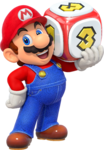
|

|

|

|
| Cheerful. Inspiring. Jumpy. Everyone loves Mario–and for good reason! | Taller than his brother. Parts his mustache in the middle. | Princess in pink. Rules over the Mushroom Kingdom. | The ruler of Sarasaland loves the thrill of the chase. |
| Wario | Waluigi | Yoshi | Rosalina |
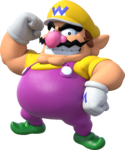
|

|

|
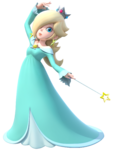
|
| This crude and rude fellow likes to toot...his own horn. | Wario's sidekick and Luigi's biggest rival (or so he thinks). | Mario's trusty steed from Yoshi's Island. Has a very sticky tongue. | Interstellar observer, protector of the Lumas, and friend to Mario. |
| Bowser | Goomba (new) | Shy Guy | Koopa Troopa |
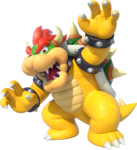
|
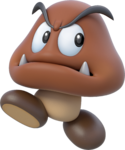
|
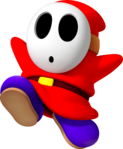
|
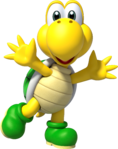
|
| King of the Koopas. Has monstrous strength and even more monstrous breath. | Bowser's first line of attack. | Masked rascal. Always seems to get in the way. | Mushroom Kingdom troublemaker. Wears its home on its back. |
| Monty Mole (new) | Bowser Jr. | Boo | Hammer Bro |
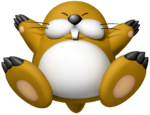
|
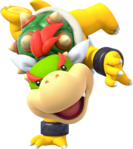
|
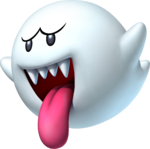
|
![Artwork of Hammer Bro in Mario Party 8 (also used in Mario Super Sluggers, New Super Mario Bros. Wii, Super Mario 3D Land,[1] Super Mario Party and Mario Kart Tour)](https://mario.wiki.gallery/images/thumb/4/4c/MP8_Hammer_Bro_Artwork.png/124px-MP8_Hammer_Bro_Artwork.png)
|
| Mischief-making mole. First time as a playable character in the Mario Party series! | Bowser’s son. Trouble-maker extraordinaire. | Ghost-like enemy who’s even more shy than Shy Guy. | Elite member of Bowser’s Koopa Troop. Wears a helmet. |
Unlockable
| Donkey Kong | Diddy Kong | Dry Bones | Pom Pom (new) |
|---|---|---|---|
![Artwork of Donkey Kong in Super Mario Party (also used for Mario Kart Tour and the Nintendo Switch version of Mario vs. Donkey Kong[1])](https://mario.wiki.gallery/images/thumb/b/b5/SuperMarioParty_DonkeyKong.png/132px-SuperMarioParty_DonkeyKong.png)
|
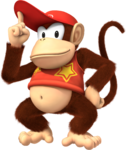
|
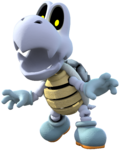
|
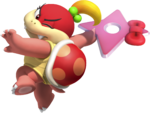
|
| Likes to crash through the jungle. Wears a nice tie. | Looks harmless but is actually a peanut-popping powerhouse. | Falls apart under pressure, but is quick to recover. | This boomerang-tossing character makes her Mario Party debut as a playable character. |
Character unlock criteria
Once the criteria has been met, the character appears in the Party Plaza. The player must then talk to the character to unlock them.
| Unlocking criteria | |
|---|---|
| Donkey Kong | Complete three different courses in River Survival. |
| Diddy Kong | Complete Chestnut Forest (World 2) of Challenge Road. |
| Dry Bones | Appears randomly after playing different modes. |
| Pom Pom | Complete Salty Sea (World 5) of Challenge Road. |
Hosts and other major characters
| Character | Description |
|---|---|
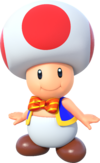
|
The main host of the game and one of the three judges, Toad guides players through the game and gives out tutorials to players. He additionally comments on the character's progress in the Party modes frequently and tallies up the results at the end of the game. |
| Toad | |
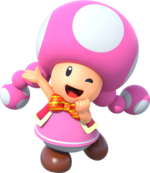
|
The secondary hostess of the game, Toadette guards the stars on the boards. Every time a player purchases a star, she moves to another location of the board by traveling on balloons. At the end of the game, she also tallies up the final scoring and comments on the results. |
| Toadette | |
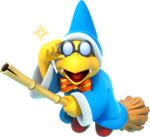
|
A mischievous, but otherwise helpful host that Bowser invites to make the judging "fair" and "impartial", Kamek helps explain various rules alongside his Toadies. He hosts the Bad Luck Spaces and Extra Bad Luck Spaces, while adding hidden variants of them in Partner Party in the middle of the match. When players unlock Toad's Rec Room and Stickers, he removes the obstructing Piranha Plants on the Party Plaza. He is featured as a major obstacle in River Survival if a player goes into the path that contains him. |
| Kamek | |

|
Represented by its head, Flutter owns a shop that players can purchase various items from. In Mario Party, the shop can be accessed by passing by the area; in Partner Party, however, the shop is required to be landed on. |
| Flutter | |

|
If a player passes by his area, Lakitu can enlist his services to steal coins for free or a Star for 30 coins. |
| Lakitu | |
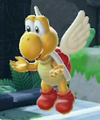
|
Koopa Paratroopa can send a player to a rival's space for five coins. It also appears in River Survival taking a snapshot of the four players as they descend down a waterfall, if players pick a path it is on. This snapshot appears at the end of the mode. |
| Koopa Paratroopa |
Other
Cameos in Absent Minded
- Buzzy Beetle
- Bony Beetle
- Boom Boom
- Fish Bone
- Mechakoopa
- Nabbit
- Spike Top
- Spiny
- Spiny Cheep Cheep
- Urchin
Boards
Super Mario Party contains four boards used in Mario Party and Partner Party mode, sharing the same locations but with a path-based or grid-based layout, respectively. This is also the first Mario Party game since Mario Party 6 not to contain any form of boss battles. Kamek's Tantalizing Tower and Tantalizing Tower Toys are unlockable boards, unlocked by playing the three starter boards of each mode at least once.
Mario Party
| Board | Description |
|---|---|
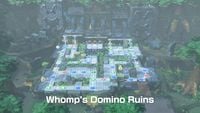
|
Can you make it through the perilous Domino Ruins paths? |
| Whomp's Domino Ruins | |
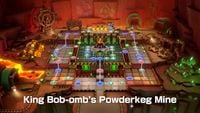
|
King Bob-omb's court is a high-risk, high-reward place to be. |
| King Bob-omb's Powderkeg Mine | |
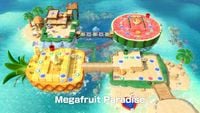
|
These four little tropical islands feature pipes you can use to warp between them. |
| Megafruit Paradise | |
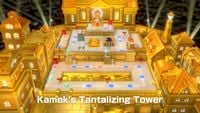
|
The cost of Stars Changes?! It's a fierce fight for coins! |
| Kamek's Tantalizing Tower |
Partner Party
| Board | Description |
|---|---|
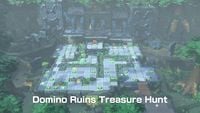
|
Talk over how to move the Whomps before taking action. |
| Domino Ruins Treasure Hunt | |
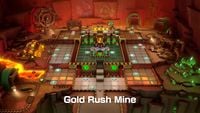
|
Use the mine-cart Bomb-omb to your advantage. |
| Gold Rush Mine | |
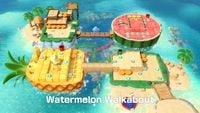
|
One trick is to split up across different islands. |
| Watermelon Walkabout | |
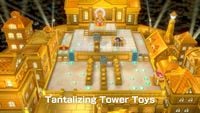
|
A gleaming board where anything goes! Your teamwork will be put to the test! |
| Tantalizing Tower Toys |
Items
Dice Blocks
- Normal Dice Block: The standard 1-6 Dice Block.
- Dice Blocks unique to each character that can be used any time they roll. They have the opportunity to increase their maximum number of rolls, affect their coin count, increase the chance of getting a number, or even cause them to get a 0. The player can also use a teammate's Dice Block if they have one with them. The following has all of the numbers on each character's Dice Block.
- Ally Dice Block: Every ally of the player(s) can use an extra Dice Block that can roll from 1-2.
Dice Blocks marked with an asterisk (*) are character Dice Blocks reused from Toad Scramble in Mario Party: Star Rush. In Wario's case, his Dice Block was originally used by Waluigi instead.
| Character | Dice Block | Ability | Numbers |
|---|---|---|---|
Mario |
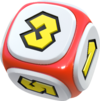 Mario Dice Block |
A useful, well-balanced die! Use the abundance of 3s to your advantage. | 1, 3, 3, 3, 5, 6 |
Luigi |
File:SMP Luigi Dice Block.png Luigi Dice Block* |
A die with high highs and low lows. It's easy to roll a 1, but that can be useful too. | 1, 1, 1, 5, 6, 7 |
Peach |
File:SMP Peach Dice Block.png Peach Dice Block* |
Odds are good that you'll roll a 4, but there's always that chance of getting a 0. | 0, 2, 4, 4, 4, 6 |
Daisy |
File:Daisydiceblock.png Daisy Dice Block |
Looking to travel 3, maybe 4 spaces? This die is for you! | 3, 3, 3, 3, 4, 4 |
Wario |
File:SMP Wario Dice Block.png Wario Dice Block* |
Sure, there are some downsides, but every other face has a 6! What could go wrong? | -2 coins, -2 coins, 6, 6, 6, 6 |
Waluigi |
File:SMP Waluigi Dice Block.png Waluigi Dice Block |
Odds are good that this die will get you at least 5 spaces! Just watch out for that coin drain. | -3 coins, 1, 3, 5, 5, 7 |
Yoshi |
File:SMP Yoshi Dice Block.png Yoshi Dice Block |
A balanced die that can go as high as 7. Even an average roll of 3 is pretty good. | 0, 1, 3, 3, 5, 7 |
Rosalina |
File:SMP Rosalina Dice Block.png Rosalina Dice Block |
An out-of-this-world die that makes it easy to get coins! Not only that, one side advances you a whopping 8 spaces. | +2 coins, +2 coins, 2, 3, 4, 8 |
Donkey Kong |
File:SMP Donkey Kong Dice Block.png Donkey Kong Dice Block |
With three 0 faces, this is a high-risk die. But the two 10 faces are a reward that might be worth it. | +5 coins, 0, 0, 0, 10, 10 |
Diddy Kong |
File:SMP Diddy Kong Dice Block.png Diddy Kong Dice Block |
A die with a 50% chance of rolling a 7?! That might be powerful enough to overlook the 0s! | +2 coins, 0, 0, 7, 7, 7 |
Bowser |
File:SMP Bowser Dice Block.png Bowser Dice Block |
You could rocket forward with a 10 or just as easily lose coins. Only the bravest are gutsy enough to use this die! | -3 coins, -3 coins, 1, 8, 9, 10 |
Goomba |
File:SMP Goomba Dice Block.png Goomba Dice Block |
A solid die that combines balanced numbers with a strong possibility of gaining coins. | +2 coins, +2 coins, 3, 4, 5, 6 |
Shy Guy |
File:SMP Shy Guy Dice Block.png Shy Guy Dice Block |
If the place you need to be is exactly 4 spaces away, use this die. Even if you roll the 0, you'll get there eventually. | 0, 4, 4, 4, 4, 4 |
Koopa Troopa |
File:Koopatroopadice.png Koopa Troopa Dice Block |
All those low numbers might seem slow and steady, but it's that 10 that'll win you the race. | 1, 1, 2, 3, 3, 10 |
Monty Mole |
File:SMP Monty Mole Dice Block.png Monty Mole Dice Block |
Without a 1 on any face, this is an effective die if you end up right next to an undesirable space. | +1 coin, 2, 3, 4, 5, 6 |
Bowser Jr. |
File:SMP Bowser Jr Dice Block.png Bowser Jr. Dice Block |
With a max of 9 but three chances to roll a 1, this die is high risk, high reward! | 1, 1, 1, 4, 4, 9 |
Boo |
File:SMP Boo Dice Block.png Boo Dice Block |
The 5s and 7s are attractive, to be sure, but keep in mind the possibility of losing coins. | -2 coins, -2 coins, 5, 5, 7, 7 |
Hammer Bro |
File:SMP Hammer Bro Dice Block.png Hammer Bro Dice Block |
You'll most likely get a 5, but even if you don't, you might get 3 coins instead! | +3 coins, 1, 1, 5, 5, 5 |
Dry Bones |
File:SMP Dry Bone Dice Block.png Dry Bones Dice Block |
Will you get a 1? Or a 6? Roll these bones and you'll either win big or inch forward. | 1, 1, 1, 6, 6, 6 |
Pom Pom |
File:SMP Pom Pom Dice Block.png Pom Pom Dice Block |
Hey, 3's a good number, right? Yeah! And who knows, maybe you'll hit the 8! | 0, 3, 3, 3, 3, 8 |
The Bob-omb appears only in King Bob-omb's Powderkeg Mine (Mario Party) and Gold Rush Mine (Partner Party). When the player passes on the Bob-omb, it follows and temporarily functions as an ally. After the set amount of turns, the Bob-omb goes away by exploding.
| Character | Dice Block | Ability | Numbers |
|---|---|---|---|
| File:SMP Bob-omb.png Bob-omb |
File:Diceydiceblock.png Dicey Dice Block |
This dice block is rolled by Bob-omb and added to your roll. It only rolls 0 or -1, so it might slow you down. | 0, 0, 0, -1, -1, -1 |
Items
- Dash Mushroom ("+3 to Dice Roll") - Adds 3 to the player's Dice Roll.
- Poison Mushroom ("-2 to rival's Dice Roll")[5] - Subtracts 2 from a rival's Dice Roll on their next turn, chosen by the player.
- Golden Dash Mushroom ("+5 to Dice Roll") - Adds 5 to the player's Dice Roll.
- Golden Drink ("Gain 1 coin each time you move. Can't use this while Peepa is in the way.") - Turns the player golden, akin to the Gold Flower, granting the player 1 coin for each space moved this turn.
- Golden Pipe ("Warp close to a Star.") - Warps the player to the space before the Star Space.
- Coinado ("Steal 5 to 10 coins from rivals.") - Summons a tornado to steal coins from a rival of the player's choice.
- Ally Phone ("Call on an ally.") - Grants the player a random ally.
- Custom Dice Block ("Roll whatever you want from 1 to 6. Stops allies from rolling dice.") - Lets the player select their Dice Roll from 1 to 6, and their allies will not roll an extra Dice Block this turn.
- Peepa Bell ("Call a Peepa to take 1 coin from a rival each time they move.") - Subtracts 1 coin for each space that a rival moves on their next turn.
- Fly Guy Ticket ("Call a Fly Guy to steal an item from a rival.") - Steals a random item from a rival of the player's choice.
- Warp Box ("Warp close to a teammate.") - Warps the player to a space adjacent to their teammate.
- Hidden Block Card ("If you're lucky, you might get a Star!") - Immediately spawns a Hidden Block, giving the player a chance to gain coins or a Star.
- Dueling Glove ("Choose a rival to duel. The winner gets the loser's ally.") - Lets the player challenge a rival to a duel, and the winner gets to choose an ally to steal.
- Double Star Card ("Allows you to get more Stars than usual. Only usable on a Star Space.")[5] - Allows the player to purchase double the amount of Stars from the Star Space.
Board-exclusive items
- Key - In Domino Ruins Treasure Hunt, the key is used to open a treasure chest containing a Star. In Tantalizing Tower Toys, it is used to open a gate containing extra coins and spaces (exclusive to Domino Ruins Treasure Hunt and Tantalizing Tower Toys).
- Pickaxe - Used to break open a rock that contains a Star (exclusive to Gold Rush Mine).
- Silver Pick ("A useful tool for sticking fruit.")[5] - Used on the watermelon island to raise a space up to reach a high platform with coins and a Star (exclusive to Watermelon Walkabout).
- Capsule Ticket - Used to obtain a capsule from the capsule machine (exclusive to Tantalizing Tower Toys).
Board items
- Coins
- Red Coins (+5 to coin count)
- Star
- Hidden Block, a Gold Block that has a chance to rewarding the player who found it with a Star.
- A cloud symbol which summons Lakitu to steal coins from a rival for free or give the player a star for 30 coins.
- A wing symbol, which summons a Koopa Paratroopa that will carry its summoner to a rival's spot for five Coins.[6]
- A Wiggler symbol, which summons a Flutter who owns an item shop.
Spaces
It has been requested that this section be rewritten. Reason: it should be reorganized into a table (tagged on May 14, 2021)
- Start Space - A blank green space where every player starts on the board.
 Blue Space - Grants three coins to players that land on it.
Blue Space - Grants three coins to players that land on it. Red Space - Takes three coins from players that land on it.
Red Space - Takes three coins from players that land on it. Event Space ("Landing here could set off a terrifying trap. Or not, but do you really want to risk it?") - A green space with an exclamation mark.
Event Space ("Landing here could set off a terrifying trap. Or not, but do you really want to risk it?") - A green space with an exclamation mark. VS Space ("Everyone wagers coins before facing off in a VS minigame!") - An orange diamond with the word "VS" on it that acts similar to the Battle Space. Here, everyone plays a rumble minigame after forking over a number of coins determined by roulette. The winner gets a majority of the coins wagered. After the minigame ends, the VS Space turns into a Blue Space.
VS Space ("Everyone wagers coins before facing off in a VS minigame!") - An orange diamond with the word "VS" on it that acts similar to the Battle Space. Here, everyone plays a rumble minigame after forking over a number of coins determined by roulette. The winner gets a majority of the coins wagered. After the minigame ends, the VS Space turns into a Blue Space.- File:SpaceAlly.jpg Ally Space ("Call one new ally to join you!") - A green space with a friend icon on it.
 Item Space ("Pick up helpful items. It never hurts to land here!") - A green space with a mushroom on it.
Item Space ("Pick up helpful items. It never hurts to land here!") - A green space with a mushroom on it. Lucky Space - A green space with a clover on it where the player can win items or coins.
Lucky Space - A green space with a clover on it where the player can win items or coins. Bad Luck Space ("Depending on where the wheel stops, you could lose items or coins.") - A red jagged space with an exclamation and question mark that acts similar to a Bowser Space albeit with Kamek instead of Bowser.
Bad Luck Space ("Depending on where the wheel stops, you could lose items or coins.") - A red jagged space with an exclamation and question mark that acts similar to a Bowser Space albeit with Kamek instead of Bowser.
- File:SpaceExtraBadLuck.jpg Extra Bad Luck Space ("Depending on where the wheel stops, you could lose coins or stars.") - Appearing on the last three turns, all Bad Luck Spaces become dark-red spaces and the events on the wheel are harsher.
Minigames
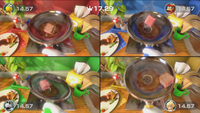
- Main article: List of Super Mario Party minigames
Super Mario Party has a total of 84 new minigames. Of these, 30 of them are Free-for-All minigames, 10 of them are 2-vs.2 minigames, 10 of them are 1-vs.3 minigames. New categories of minigames introduced are 10 Co-op minigames, where all 4 players work together to beat the minigame; 10 Team minigames, where players form teams of up to 8 and they all work together against each other; 10 Rhythm minigames, where players get points by performing tasks to the rhythm of a song; and 4 Toad's Rec Room minigames, where players have the option to connect two undocked Nintendo Switch consoles together and play on both of them.
Differences from previous Mario Party games
- Rather than a simple menu, there is now a complete controllable hub world.
- Character selection now comes before selecting any in-game modes.
- Practice mode in minigames now take place in the Rules screen itself, instead of being separate.
- On the rules screen, all players need to press a button to confirm they are ready to start instead of only the first player pressing it, similar to the other Mario Party games since Mario Party 9.
- In Partner Party, the Dice rolls are shared between the two players.
- Party Mode now only goes up to 20 turns, and 30 turns on Kamek's boards; previous games have the player decide between 10-50 turns.
- After a 2 vs. 2 or 1 vs. 3 minigame or in any mode where the player competes with teammates, there is a bonus where they can high-five their teammates to earn bonus coins.
- Bonus Stars are determined based on turn amount. 20 and 30 turn games gives out the traditional three Bonus Stars; for 10 and 15 turn games, only two Bonus Stars are distributed.
- Reflecting the original Mario Party gameplay, the free-for-all minigames always treat only the 1st-placed character as the winner regardless of what rank characters placed, much like in other Mario Party games prior to Mario Party 9.
- By extension, the minigame results screen also appears to be more similar to Mario Party games prior to Mario Party 9: result animations are shown in the minigame itself instead of on a separated, simple screen, and 2nd- and 3rd-place result animations and rankings on the screen are no longer present, instead only showing the name of the 1st-placed character, and the losers use one specific animation (the 4th-ranked animations from previous games for most returning characters) regardless of what rank they placed.
- However, animations of what would be the characters' 2nd- and 3rd-place results can be on the results screen after a Mario Party is completed.
- By extension, the minigame results screen also appears to be more similar to Mario Party games prior to Mario Party 9: result animations are shown in the minigame itself instead of on a separated, simple screen, and 2nd- and 3rd-place result animations and rankings on the screen are no longer present, instead only showing the name of the 1st-placed character, and the losers use one specific animation (the 4th-ranked animations from previous games for most returning characters) regardless of what rank they placed.
- The main text fonts from Mario Party 9, Island Tour, and 10 (which was first introduced in Super Mario 3D Land), Star Rush and The Top 100 have mostly been replaced by that of Mario Kart 8. The timer and the score counter also use said font rather than the secondary text font from Mario Party 10, Star Rush, and The Top 100 (as in 10), or the main text fonts from the previous games (as in the handheld games).
- As such, the title logo no longer uses the series logo from the previous games, which is the same font as the in-game main text font from Mario Party 9, Island Tour, and 10.
- Dice Blocks as well as the "Start!"/"Finish!" texts still use the previous main text font, and the secondary text font from Mario Party 10, Star Rush and The Top 100 is still used for some in-game texts as well.
Regional differences
- In the British English version of the game, pronouns refer to Birdo as a male. The American English version and most other versions of the game have Birdo referred to as a female. In the French and Chinese versions, Birdo uses ambiguous pronouns.
- In the British English version, Toadies are named Magikoopas.
Updates
In order to play online, players must have downloaded the most recent software update.
Ver. 1.0.1
An update was released on March 21st, 2019. The following changes were made:
- Made fixes to the data scheduled for an upcoming release.
Ver. 1.1.0
An update was released on April 27th, 2021. The following changes were made:
Feature Added
- You can now play the following modes over the internet:
- Mario Party
- Partner Party
- Free Play (Minigames)
Playing over the internet
- To play over the internet, select either Mario Party, Partner Party, or Minigames, then select Online Play.
- There are two ways to play over the internet: Friend Match, where you can play with Friends, and Private Game, where you can play with anyone using passwords.
- The combinations through which you can play over the internet are as follows:
- Up to 1 player per system (you can play with between 2 and 4 players)
- Up to 2 players per system (you can play with between 3 and 4 players)
If two players are each playing on their own systems, they cannot play with two players using a third system.
- Playing over the internet supports the Invite Friend feature. If you select Invite Friend on the screen at which you're waiting for rivals, your selected Friends can join from the Online Play Invites on their user-page icon in the top left of the HOME Menu.
- Online Mariothon does not support the Invite Friend feature.
- When playing over the internet, all 20 characters and all maps are available, regardless of your current in-game progress.
- When playing over the internet, 70 of the total 80 minigames are available to play.
- The following 10 minigames are not available when playing over the internet.
- Strike It Rich
- Time to Shine
- Take a Stab
- All-Star Swingers
- Rhythm and Bruise
- Pep Rally
- Wiped Out
- Fiddler on the Hoof
- Clearing the Table
- Baton and On
- Play data won’t be saved when playing over the internet.
The 10 minigames unavailable are from Sound Stage. Although the Chinese version of the game was released after this update, it is based on the ver. 1.0.1 update and is not compatible with online play.[citation needed]
Staff
- Main article: List of Super Mario Party staff
Super Mario Party is developed by Nd Cube and co-developed by CAProduction, the teams primarily responsible for many Mario Party titles, and the game is published by Nintendo. Shuichiro Nishiya, who has directed the most Mario Party installments and has been directing many Mario Party installments since Mario Party 6, reprises his role as the director for the game. Many of the game's directors and chief directors have worked on a Mario Party installment prior to Super Mario Party, such as music director, Chamy Ishi, who has worked on directing music for Mario Party installments since Mario Party 9.
Reception
Critical reception
Super Mario Party has been met with generally positive reviews, garnering an average of 76 based off 84 reviews on Metacritic[7] and a 74.35% based off 36 reviews on GameRankings[8], notably receiving more praise than most Mario Party games in the series, being second only to the original Mario Party title for the Nintendo 64. Critics have generally praised the return to the original method of playing the game's main mode, blended with elements new to the series, as well as the amount of minigames and modes, in addition to the party experience with multiple players. Critics have compared the game favorably to the recent past installments of the Mario Party series. Much of the criticism has been directed at the number of boards, the board design, CPU intelligence, the single-player experience, and the online implementation.
Casey Gibson of Nintendo World Report gave Super Mario Party an 8/10,[9] praising this direction of the Mario Party series favorably compared to the Mario Party titles where "everyone was placed in the same vehicle, which would then move around the board at the same time." While Gibson has noted that the time can feel "drawn out" while playing with computer players, it was noted that the pacing can feel better than played with friends. Gibson has additionally praised the assortment of the 80 minigames where they are "actually a ton of fun and are pulled off very well", citing Sizzling Stakes as one of the favorite minigames played. The most jarring criticism from Gibson has been directed towards the online play and its features and options (which she considers restrictive), such as its rotation of 10 minigames, where she summarizes, "Overall, although the mode is fun, it won't likely see much playtime as you repeat the same few games over and over. It's a tease of what could be, but ultimately fails to add much value to the overall package." Colette from My Nintendo News gave the game an 8/10, echoing sentiments from Gibson, citing the previously released Mario Party: The Top 100 and Mario Party 10 as disappointing, as well as stating "the less said about Mario Party: Island Tour (2013), the better", while praising Super Mario Party in comparison, saying it "changes the sour flow into something much sweeter."[10] Colette has cited elements of minigames that she found frustrating, such as the CPU players in Pull It Together in the Challenge Road, but has otherwise mostly praised minigames seen as fun. Colette additionally criticizes the online functionality (finding it to be disappointing), although she did note that Super Mario Party was the first Mario Party game to feature online play.
Samuel Claiborn of IGN scored Super Mario Party a 7.3/10,[11] calling the game, "the best Party in two [home] console generations." He has praised the game for a perceived sense of being competitive, strategic, and fun, especially in Partner Party. However, Claiborn has cited the other modes not Mario Party or Partner Party as "filler", preferring the focus on the aforementioned two modes. He has also called the amount of boards lacking and that "Parties will get stale fast" due to what was considered a low number of boards and their believed simplicity, comparing unfavorably to Mario Party 5 and Mario Party 6. Claiborn has also described motion controls and the Joy-Con-exclusive functionality as troublesome, but not "as bad as the worst Wii-era games." Additionally, Claiborn has described the Switch functionality to interact with another console as cramped and "not put to great use". The amount of minigames have been praised, as well as the stated attention to detail in the minigames. He ended his review with the statement, "Super Mario Party delivers the couch multiplayer experience the series is famous for with an awesome new layer of strategy, 80 mostly-great minigames, and the quirky tech of the Switch controllers to keep things feeling fresh. The downside is that with the Switch's controllers come some annoyances that make getting people settled onto your couch a bit more of a hassle than previous parties, and the best games are prone to annoying random upsets. But it's far better paced than recent games and Super Mario Party reset my expectations of the series with its graphics and gameplay creativity." Stefan L. of TheSixthAxis has given the game a 6/10,[12] criticizing an apparently 'safe' approach to gameplay, the online implementation, the lack of single-player handheld mode compatibility, the amount of boards, and the amount of minigames for some modes, while praising the return to the original style of play, the strategy of character die, Toad's Rec Room minigames, and the HD Rumble tune. Stephan has noted that the content is "spread wide, but it's not very deep", and also noted that the available boards are not engaging. Stephan has criticized the game's AI, calling them "dumber than a sack of bricks at crucial moments." In the conclusion, he stated that "Super Mario Party is just a very safe game. It brings back the classic Mario Party board game form, marrying it with some of the better ideas from Mario Party: Star Rush, but it's light on the number of boards to play, lacks depth in other game modes, and misses opportunities for solo handheld and online multiplayer. It's Mario Party, but it's not particularly super."
| Reviews | |||
|---|---|---|---|
| Release | Reviewer, Publication | Score | Comment |
| Nintendo Switch | Becca S., GameSpew | 9/10 | "Super Mario Party manages to perfectly blend nostalgia with brand new gameplay, and no party's going to be complete without it." |
| Nintendo Switch | Casey Gibson, Nintendo World Report |
8.5/10 | "Mario Party has seen its fair share of good and bad over the years, but Super Mario Party swings the pendulum back in the right direction. The return of the classic style is a welcome one, and the plethora of different minigames hit the mark more often than not. It would have been nice to see another board or two, but the assortment of other fully-fledged modes helps to mitigate that feeling." |
| Nintendo Switch | Colette, My Nintendo News |
8.5/10 | "With impressive aesthetics and delightful character animations, Nd Cube has finally found its rhythm with Super Mario Party. Although the game isn’t without its issues, these are few and far between, making the eleventh instalment one of the best it has been in years." |
| Nintendo Switch | Ryan Janes, Nintendo Insider | 8/10 | "Super Mario Party manages to get the series back on track in a big way, it's selection of modes engaging, mini-games exciting and overall sense of fun high. While not every idea is a winner, it nails what fans have been after for many years while also injecting a few new twists of its own." |
| Nintendo Switch | Alex Olney, Nintendo Life |
8/10 | "This isn't a cash-grab with Mario's face on the front; this is a well-constructed and beautifully realised Mario Party game which takes the series right back to its roots, but without being a straightforward rehash. There are a few interesting ideas that feel a little bit underdeveloped, but on the whole Super Mario Party is a true return to form." |
| Nintendo Switch | Samuel Claiborn, IGN | 7.3/10 | "Super Mario Party delivers the couch multiplayer experience the series is famous for with an awesome new layer of strategy, 80 mostly-great minigames, and the quirky tech of the Switch controllers to keep things feeling fresh. The downside is that with the Switch's controllers come some annoyances that make getting people settled onto your couch a bit more of a hassle than previous parties, and certain minigames are prone to annoying random upsets." |
| Nintendo Switch | Brian Shea, Game Informer |
7.3/10 | "Despite lackluster board design and side modes that can become repetitive, Super Mario Party is a fun group game that showcases a diverse collection of minigames." |
| Nintendo Switch | Jordan Ramée, GameSpot | 7/10 | "Most of Super Mario Party's varied assortment of 80 minigames are fun, especially if you've got a full group of four players, as the NPCs aren't smart or skilled enough to pose much of a challenge until you unlock Master difficulty. The new Partner Party, River Survival, and Sound Stage modes add enjoyable alternatives to Mario Party mode--which at least returns to its competitive roots. And even if the unique character dice blocks don't shake up Super Mario Party's four boards enough to give Mario Party mode some longevity, they implement small moments of strategy into a series that has for too long solely relied on randomness to determine a winner." |
| Nintendo Switch | Stefan L, TheSixthAxis | 6/10 | "Super Mario Party is just a very safe game. It brings back the classic Mario Party board game form, marrying it with some of the better ideas from Mario Party: Star Rush, but it's light on the number of boards to play, lacks depth in other game modes, and misses opportunities for solo handheld and online multiplayer. It's Mario Party, but it's not particularly super. " |
| Aggregators | |||
| Compiler | Platform / Score | ||
| Metacritic | 76 | ||
| GameRankings | 74.35% | ||
Sales
Within the first two days of launch, the game dominated Japanese sales charts, selling 142,868 copies and beating out competitors such as Assassin's Creed Odyssey for top chart.[13] As of December 31, 2018, Super Mario Party ranked 7th place among the top-selling Nintendo Switch games, having sold 5.3 million copies.[14][15] By March 31, 2021, the game had sold 14.79 million copies,[16] making it the best-selling Mario Party game.
Glitches
Golden Pipe Clip
In King Bob-omb's Powderkeg Mine, if the player uses a Golden Pipe while at the Blue Space directly in front of King Bob-omb, the pipe will clip through the countdown timer.
Out of Bounds in River Survival
In the Kamek's Curse route, one of the Dash Panels can be hit at a certain angle and, upon being hit, boosts the player out of bounds into the cliffside, softlocking them.[17]
Quotes
- Main article: List of Super Mario Party quotes
Announcer
- "Start!"
- "Finish!"
- "You got a Star!"
- "Ready..."
- "...Yeah!"
Gallery
- For this subject's image gallery, see Gallery:Super Mario Party.
Rosalina, Goomba, Yoshi, and Bowser with a Cheep Cheep
Shy Guy, Daisy, Waluigi, and Bowser Jr. dancing
Media
References to other games
- Super Mario Bros.: Mario's, Goomba's, Spiny's, Cheep Cheep's, and Bowser's sprites appear in Puzzle Hustle. Dart Gallery's background features neon lights resembling the overworld levels from this game. The beat music in the minigame Strike It Rich is an arrangement of the Ground Theme from this game. An arrangement of the Underground Theme from this game is played in Sound Stage when players practice rhythms before a minigame.
- Super Mario Bros. 2: Shy Guy's sprite appears in Puzzle Hustle.
- Super Mario World: Luigi's, Boo's, Koopa Troopa's, Monty Mole's, Dry Bones', Kamek's, Sumo Bro.'s, Chargin' Chuck's, Mario with Baby Yoshi, and Cape Mario's sprites appear in Puzzle Hustle.
- Mario Party series: In one of Birdo's dialogue lines, she refers to this game as the "11th party", referencing the previous ten home console Mario Party games. She also gives the player quizzes relating to the previous home console Mario Party games.
- Mario Party: The game's opening is a direct callback to this game's opening, with Mario and his friends arguing over who is the Super Star. The opening also begins from a similar camera angle.
- Mario Party 2: The music for Shell Shocked Deluxe is an arrangement of the music "Going for the Coins", which is used in several minigames, one of which is Shell Shocked.
- Mario Party 6: Peach's profile artwork is an updated version of her artwork from this game.
- Super Mario Strikers: Some of Hammer Bro's voice clips are reused from this game.
- Mario Party 8: Hammer Bro's artwork is reused from this game.
- Mario Party DS: The Star Pipe item returns under the name "Golden Pipe".
- Super Mario Sluggers: Monty Mole's artwork is reused from this game.
- New Super Mario Bros. Wii, New Super Mario Bros. 2, and New Super Mario Bros. U: In Challenge Road, the sound effect that plays when a new level opens up is recycled from these games. The sound effect that plays when Mario or Luigi collects a Gold Flower from New Super Mario Bros. 2 is recycled when a player uses the Golden Drink. Boo's artwork is reused from New Super Mario Bros. Wii.
- Super Mario Galaxy 2: Some of Yoshi's voice clips are reused from this game.
- Super Mario 3D Land: The setting of the Rumble Fishing minigame is similar to World 6-1 and other seaside-themed levels from this game. Pom Pom's artwork is taken from the game, albeit she now has claws on her fingers and her boomerang is replaced with a shuriken.
- Mario Party 9: Shy Guy's and Koopa Troopa's victory and losing animations are recycled from this game, albeit with the latter being slightly different. Shy Guy's artwork is reused from this game. King Bob-omb's artwork is also reused, albeit he does not hold a Bob-omb in his right hand and Koopa Troopa and Toad are absent.
- Super Mario 3D World: Goomba's artwork is reused from this game.
- Mario Party: Island Tour: Bowser Jr.'s and Boo's victory animations are recycled from this game. Some of Bowser Jr.'s voice clips are reused from this game.
- Mario Kart 8: The majority of the characters reuse voice clips from this game.
- Mario Party 10: The majority of the returning characters' victory and losing animations are recycled from this game. Yoshi's, Rosalina's, and Bowser's artwork is reused from this game.
- Mario Tennis: Ultra Smash: Some of Mario's voice clips are reused from this game.
- Super Mario Maker: Peach's, Daisy's, Wario's, Waluigi's, Yoshi's, Rosalina's, Donkey Kong's, Diddy Kong's, and Toad's Costume Mario sprites and Chain Chomp's (Super Mario Bros.-style), Blooper's, Hammer Bro's, and Bowser Jr.'s (Super Mario World-style) sprites appear in Puzzle Hustle.
- Mario Party: Star Rush: Diddy Kong's victory and losing animations are recycled from this game. The concept of character-specific Dice Blocks returns, with some Dice Blocks being reused (albeit with different names). The ally recruiting mechanic from this game also returns as part of Party Mode and the main menu hub world is similar to the one from this game. The Coinado item returns as well. Bob-omb's role in Gold Rush Mine is similar to Peepa's role in this game, where both characters will join as "allies" and roll a negative Dice Block. Partner Party has the players move the number of spaces to wherever they want to land on, just like in Toad Scramble and Balloon Bash from this game.
- Mario Sports Superstars: The horses in Fiddler on the Hoof reuse their Balance-type design from this game.
- Super Mario Odyssey: Notes in River Survival reuse their designs and sound effects from this game. Some of Luigi's voice clips are recycled. The minigame Making Faces has a similar premise to Picture Match.
- Mario Party: The Top 100: The description of Wario on the Super Mario Party official website is similar to his description in this game's website description, saying that he is "crude and rude" and "likes to toot... his own horn".
References in later games
- Super Smash Bros. Ultimate: Mario's Dice Block and River Survival appear as spirits, originally only obtainable during the "Oh Yeah! Mario Time!" spirit event that ran from December 27, 2018 to January 1, 2019 prior to the version 2.0.0 update.
- Mario Kart Tour: Donkey Kong's artwork is reused in this game. Monty Mole's voice clips are also reused in this game. Dry Bones (Gold) and Shy Guy (Gold) resemble Dry Bones's and Shy Guy's looks when under the effect of a Golden Drink from this game.
Names in other languages
| Language | Name | Meaning | Notes |
|---|---|---|---|
| Japanese | スーパー マリオパーティ[?] Sūpā Mario Pāti |
Super Mario Party | |
| Korean | 슈퍼 마리오 파티[?] Syupeo Mario Pati |
Super Mario Party |
Trivia
- This is one of two Mario Party games to not feature a Bowser-themed board, the other one being Mario Party 3.
- This is the first Mario Party game since the international versions of Mario Party 5 and the Japanese version of Mario Party 7 to have a female announcer.
- A promotional browser game was released on the Play Nintendo website in 2018 called Super Mario Party Fun Trivia Quiz.
- With a total of four, this Mario Party game features the fewest boards.
- This is the first home console Mario Party game since Mario Party 4 where Toad is non-playable.
- NPCs who are considered Bowser's minions speak to Bowser and Bowser Jr. more fondly than to other characters, usually referring to them as "Lord.", while Bowser Jr. also calls Bowser as "dad" during the conversations.
References
- ^ https://e3.nintendo.com/#the-party-comes-to-nintendo-switch-with-this-complete-relaunch-of-the-mario-party-series
- ^ a b c Cite error: Invalid
<ref>tag; no text was provided for refs namedE3Site - ^ Emma Kent. (August 24, 2018)Super Mario Party's use of two Switch screens is a technological marvel Eurogamer. Retrieved September 4, 2018.
- ^ Official Super Mario Party website
- ^ a b c KokiriGaming. (October 23, 2018). Super Mario Party - All Items. YouTube. Retrieved February 4, 2021.
- ^ https://www.youtube.com/watch?v=8IvmajTJivI&feature=youtu.be&t=8m59s
- ^ Metacritic score for Super Mario Party. Metacritic. Retrieved October 10, 2018.
- ^ GameRankings score for Super Mario Party. GameRankings. Retrieved October 10, 2018.
- ^ Gibson, Casey. (October 3, 2018) Super Mario Party (Switch) Review. Nintendo World Report. Retrieved October 10, 2018.
- ^ Colette. (October 3, 2018) Review: Super Mario Party For Nintendo Switch. My Nintendo News. Retrieved October 10, 2018.
- ^ Samuel Claiborn (3 Oct 2018) Super Mario Party Review. IGN. Retrieved October 10, 2018.
- ^ Stefan L. (October 3, 2018) Super Mario Party Review. TheSixthAxis. Retrieved October 10, 2018.
- ^ Lamoreux, Ben. (October 10 2018) Super Mario Party Dominates the Japanese Charts at Launch Gamnesia. Retrieved March 15, 2019.
- ^ (December 31, 2018) IR Information: Sales Data - Top Selling Title Sales Units Nintendo. Retrieved March 15, 2019.
- ^ Lamoreux, Ben (January 31, 2019) Super Mario Party Hits 5 Million Sales Gamnesia. Retrieved March 15, 2019.
- ^ Nintendo (n.d.) Top Selling Title Sales Units. Nintendo Japan. Retrieved May 6, 2021. Archived from the original on May 6, 2021.
- ^ Supper Mario Broth
